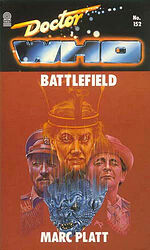
There are 2 reviews so far. To add a review of your own for this item, visit the voting page.
| By: | Eric Reiver , New York |
|
| Date: | Sunday 1 November 2009 |
|
| Rating: |   10 10 |
One of the best Target novalizations ever. I found it by accident in a used bookstore. The action is relentless. The pacing is profound. Platt's descriptions are quick and sharp to the last degree.
Marc Platt remains a brilliant writer. The book is richly revealed in a whirling map of color and prose. A superb evocation on all levels. I would remember this book as "high" art in Doctor Who.
| By: | David Layton, Los Angeles, United States |
|
| Date: | Friday 7 May 2021 |
|
| Rating: |    7 7 |
The second Doctor Who script from Ben Aaronovitch was a disappointment after the well designed "Remembrance of the Daleks." In rough outline, "Battlefield" is quite similar. It has two contending alien factions (in this case from a parallel universe) that should not be on Earth fighting a battle on Earth to capture an object of great power. It also has The Doctor as somehow guardian or otherwise responsible for this artifact. Unfortunately, the formula was not as effective the second time. One reason is that the motives of the factions, and who is on whose side, are not always clear. This had been a problem in "Remembrance," but becomes a major problem in "Battlefield." More importantly, the background is not as carefully worked out, creating huge gaps in the plot, leaving the viewer wondering just why things are happening in the way they are happening. Plus, the issue on which the plot hangs, that of world-destroying power (nuclear weapons) being carelessly managed for the personal gain of the powerful, arrives late in this script; whereas, the issue in "Remembrance" of racism is clear throughout. The biggest problem, though, is the attempt to recreate the King Arthur legends in Doctor Who terms. While it had been long a fan wet-dream to have The Doctor as Merlin, when it came to actually making that connection, it came across as artificial, forced, and too tiresomely obvious to bother with.
Marc Platt's novelization of the script goes a long way to fixing some of the most troublesome problems of the script. Most importantly, many of the missing explanations that would have made the TV version less of a muddied mess are in the novel. Thus, the reader finally understands that clearly the Arthur-related characters come from a parallel universe in which there is a strange mix of technology and magic, that Morgaine's magic is not as effective in our dimension than in hers, that Excalibur is more than just a sword, how the future Doctor/Merlin may have escaped being frozen by Morgaine, and more. It also explains why The Doctor is so interested in names, such as Winifred and Ancelyn. Still, Platt loves revealing things obscurely (a trait common in his scripts for Big Finish audios), and so the reader gets information through point of view of such things as the TARDIS and the sword, or through what appear to be throwaway bits of dialogue.
In the end, "Battlefield" as a novel is still a flawed story, but is much more enjoyable and sensible than the TV original.


